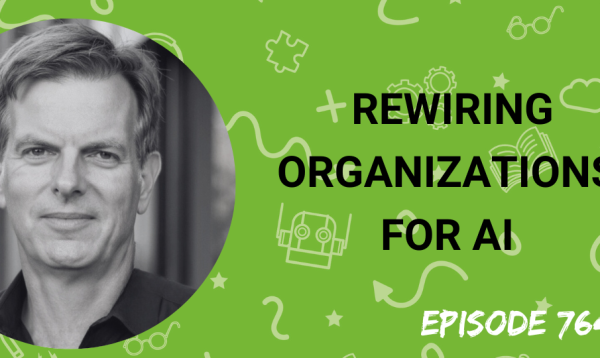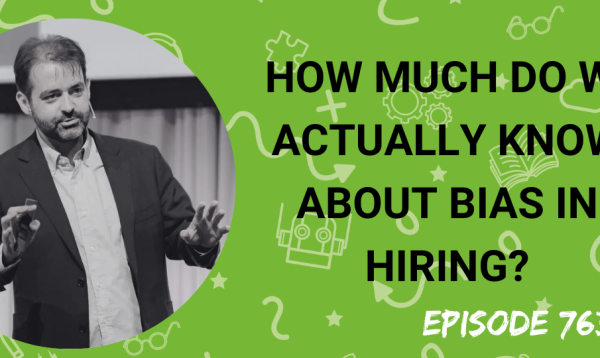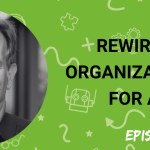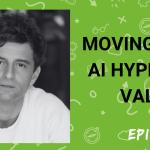One of my favourite things about living near Edinburgh is festival time in August. As well as the world famous Edinburgh Fringe, the city hosts many other festivals during the month including Turing Fest, a leading tech industry conference which I have enjoyed attending for the last couple years.
My guest this week is James Mayes, CEO of Mind The Product who was at Turing Fest this year delivering a presentation on Remote Working. I caught up with him in the expo hall after he came off stage, to find out more about a topic that is hugely relevant to the world of HR and Recruiting.
In the interview we discuss:
• Mind The Product and James’ background in the recruiting industry
• What does remote working actually mean and how can it be inclusive?
• “Remote first” thinking
• How to run a conference call with remote workers
• Te importance of face to face contact
• Why a short office closure can build empathy
James also identifies companies with a successful remote working strategy and share some thoughts on Turing Fest itself.
James’ presentation slides on SlideShare
Subscribe to this podcast on Apple Podcasts
Transcript:
Matt Alder [00:00:00]:
Support for this podcast comes from Smart Recruiters, the hiring success company. Smart Recruiters is an enterprise grade talent acquisition suite designed for hiring success. Move beyond applicant tracking with a modern platform that provides everything you need to attract, select and hire the best talent. From candidate relationship management, sourcing and recruitment marketing to screening, selection and offer management experience. A talent acquisition suite with a user experience that candidates, hiring managers and recruiters all love. Companies from Kelly Services to Visa to Bosch leverage smart recruiters to achieve hiring success and expand their business. Visit smart recruiters@www.smartrecruiters.com to find out why companies across the globe consider them the number one ATS replacement.
Matt Alder [00:01:09]:
Hi everyone, this is Matt Alder. Welcome to episode 143 of the Recruiting Future podcast. One of my favourite things about living close to Edinburgh is festival time in August. As well as the world famous Edinburgh Fringe, the city hosts a number of other festivals simultaneously, including Cheering Fest, a leading tech industry conference. My guest this week is James Mayes, CEO of Mind the Product. James was at TuringFest this year delivering a presentation on remote working. I caught up with him in the Expo hall after he came off stage to find out more about a topic that’s very, very relevant to the world of recruiting and hr. Hi James, how are you?
James Mayes [00:02:01]:
Very well, thanks Matt. Great to see you again.
Matt Alder [00:02:03]:
So let’s give everyone a bit of context. Where are we?
James Mayes [00:02:07]:
We are in Edinburgh this week attending Turing Fest. It’s Scotland’s premier tech event with I think six different stages this year, covering everything from culture through engineering, product management, growth. I think there’s a couple of others as well. Event’s been running three or four years. I think it’s my third time here.
Matt Alder [00:02:24]:
Absolutely it’s my second time here. We’re currently sitting in the the Expo hall watching the world. Watching the world go by. Dreaming of the. Dreaming of the drinks party later on. Now could you. You’re kind of a bit of a. An escapee from the recruitment industry. That’s how I just how I describe you. Could you sort of tell everyone a bit about yourself and what you do?
James Mayes [00:02:45]:
So I co founded and run a company called Mind the Product where we basically run conferences, meetups and workshops around the world for a global community of about 125,000 product managers, as with recruiting fell into that by accident. I got involved with Mind the Product in a fairly similar way. The original three co founders were Looking at launching the conference for the first time, looking for a bit of commercial advice. I happen to be working with one of them at a London startup in the recruiting space, and things went from there.
Matt Alder [00:03:12]:
That’s cool. And you run events all around the world. You just run one in San Francisco. What was that like?
James Mayes [00:03:18]:
Yes, San Francisco is one of our two flagship events. We do London and San Francisco each year. So we had 1600 people there, some pretty spectacular speakers. It’s the fourth time we’ve run in San Francisco now, and it just seems to keep getting bigger and better. There’s a couple of things that we do that make it very different from most tech events. For example, the. The experience that we design is very much focused on the delegates rather than the sponsors, which I think makes a significant difference. And it’s very much something that we get a lot of positive feedback on when we go get those scores afterwards.
Matt Alder [00:03:48]:
So you’ve just done a talk on remote working because the mind, the product team, all work remotely. It was kind of really interesting and I think it’s certainly a topic that is of interest to the audience of the podcast. I’m seeing more and more debates about remote working. Personally, I’ve been remote. I can’t even say it. Personally, I’ve been remote working for 10 years now, and I know you’ve been doing it for longer. So let’s start off with the definition. What is your definition of remote working? Is it lying on a beach somewhere looking at a laptop?
James Mayes [00:04:23]:
Is it hell? One of the slides I used earlier was that guy lying back on the beach with his laptop, but it’s quite clear that he’s got the screen brightness turned way up to combat the sun glare. The Battery’s dead in 10 minutes flat and there’s no WI fi anywhere near him. It wouldn’t be a paradise island if your email could still reach you. For me, remote working is simply defined by saying it’s when your team are not 100% co located. Now, from there, it can be a scale. You have some people that come in a couple of days a week, some people that work fully remote. It’s not a clear definition yet. What I would say is that I feel the term distributed teams actually describes it slightly better than remote working.
Matt Alder [00:05:00]:
So in your presentation, you talked about the shared attributes that companies who are really successful at this have. Could you tell us a little bit about that?
James Mayes [00:05:10]:
Yes. I think the first part to it is that the companies that really do make a success of this are the companies who take a mindful approach to it. So they start thinking about what kind of experience they want their employees to have. Things like the quality of kit that you have at the office should be replicated at home. Things like you have great desks and office chairs to make sure people are comfortable and don’t injure their backs, the spines, their necks. And yet a lot of the time people working at home, they’re at the dining room table. That thought, that intent is not necessarily something that costs you a huge amount of money, but it does significantly impact the well being and productivity of your employees.
Matt Alder [00:05:43]:
Absolutely. And one of the things you said that kind of resonated with me was, you know, about being remote first, or very least remote, remote equal. And, you know, being very mindful of the needs of remote workers.
James Mayes [00:05:59]:
Yeah. And I think it’s, you know, it’s not necessarily dissimilar to the people that design software where they’re starting now to actually think about remote mobile first. Now, it used to be the case that everything was used on a desktop. Well, that’s not the case anymore. Things are being used far more on mobile and people are designing with the mobile use case in mind at the outset. I think the same is starting to happen now with team design and some of the world’s leading organizations and some of the examples that I referenced in the talk earlier today. People are designing their team organization, their management structures, remote first. They are thinking about what that remote experience is like as the uppermost thing in mind. So in that respect, I’m talking about how you communicate, how you communicate decisions, not just the decision itself, but also why the decision was made, what it’s aimed to achieve, what risk you might be trying to mitigate to an extent. It’s also looking at things like how do you measure? So every organisation wants to measure its employees to a reasonable degree. But when people are remote, there’s a level of mistrust that some organizations have which leads them into over monitoring. The last thing you want is to end up with a Big Brother scenario because that’s ending well for nobody.
Matt Alder [00:06:59]:
That’s very interesting. And you also sort of talked about your experience with your own team. And one of the things I found really interesting was you were talking about timing, so your team’s all over the world and you were talking about finding the right time, you know, to get on calls and talk to each other. But you took that a stage further and took it into the realms of finding the right time for the individual. So you have people who work very early and people who have, who Kind of, you know, are better at working late. I mean, what is your experience, you know, working with your remote team? Where are they based and how does that sort of play out in practice?
James Mayes [00:07:36]:
So at the moment we’ve got people in the us, the Far east and Europe, so obviously there’s a time zone issue there to take account of. But as you referenced, we’ve got some people who prefer to start early, some people who prefer to start late. In my particular case, I actually tend to clock off for a couple of hours late afternoon, hang out with my kids after school, but then I’ll get back on the phone and I’ll be working late into the evening because it’s the perfect time for me in London to be doing calls with some of our partners in San Francisco. So it’s very much about finding a working pattern that actually suits each individual within that organisation. There’s very little where we actually need to make sure the entire company is online at one time. We can do it at a stretch, but it’s more about the individual needs and the individual people that are working together and trying to address those aspects correctly.
Matt Alder [00:08:17]:
Now, in the. In the second half of your presentation, you, you know, you delivered kind of lots of pieces of practical, you know, practical advice to people who are building remote teams or thinking about having remote teams. Now, we don’t really have time to go through every single. Every single. Every single one. And I’m going to post a link to your slides on SlideShare so people can sort of look through and see what those tips were. But what would be the sort of. The main one, say, the kind of. The three highlights from the advice that you gave for people looking to improve the way their remote teams work?
James Mayes [00:08:50]:
Okay, so for the first one, we’ll go for the conference call. Typically when you have a team at the office and a couple of people remote, the office team are all around one big table together. So as the debate starts to get heated, if you’re discussing some certain aspects of a project or something that you’re working on, those people start talking pretty much directly to one another. Tempos go up and the poor person sat on the end of the conference call at home ends up pretty much slumped over their laptop, losing the will to live. It’s pretty much the definition of excluding somebody’s voice. What I would say with that one is if you can get. If you’ve got those people in the office, they’ve all got a laptop, have them stay at their desks. And then when they all dial in, they’re all equal, they’ll all show up in the call window equally. So just visually the entire thing feels equalized. Secondly, I would look at the opportunities that you do have where you can bring the team together. So for our business, for example, we ran the conference in San Francisco two weeks ago. I made sure that we took the entire team out there and we actually built in a couple of days after the conference for the team to be together to decompress. One of those days we booked a minibus. We just took the team up to Sonoma and had a very chilled out day of wine tasting. Thoroughly enjoyable. Great way of actually building those bonds. Another story that I’m familiar with around conferences, the Braintree team, obviously a technology company, they bought their entire product team to mine the product a couple of years ago and they booked the day off afterwards as a retro. So throughout the conference itself, they were all taking notes and contributing those to a shared Trello board. The day after, they had a team off site retro, where they worked through everything that they picked up at the conference, all the different angles that different people had identified and then ratched on that. Which of these things resonate most with us as a team? Which of these things are going to be our core takeaways that we are going to go and action as a group? So they actually used one opportunity to build on another, which I thought was absolutely fabulous. The final one I’ll point to is a company in London called FutureLearn who recently hired their first remote worker. And one of the first things that they did when they hired this guy was to close the office for a week. They sent everybody home. It wasn’t because they needed to redecorate the office, although they had a nice handy opportunity to do that. The main reason for it was to actually say, firstly, we want this new hire to really feel included. We want this new hire to feel as though we’re recognizing the trials and tribulations that remote working can bring. But also we want the core team to actually understand what it feels like to work from home, what it feels like to have that disconnect, to be reliant solely on messaging service and conference calls, and to be without the water cooler banter that they’ve been getting. It changes the context of communication within a company completely. And the only way you can really understand it is to experience it.
Matt Alder [00:11:18]:
I thought that was an absolutely, absolutely brilliant point. And I’ve seen, you know, I’ve seen a few companies, actually large companies as well, sort of, you know, do that, do that. Kind of thing. So, you know, finally, you know, back to. Back to Cheering Fest. I think there’s one more. One more keynote left and then we’re all off to the party and out into the broader Edinburgh Festival. Other than the parties and the rest of the Edinburgh Festival, what’s been your highlight of the last two days here?
James Mayes [00:11:44]:
I think with TuringFest, because it’s got a breadth of different stages, there are a number of different disciplines represented here. And the serendipitous conversations that you can have in the expo hall and just wandering the corridors, getting involved with different people, it’s very, very easy to get siloed into your own particular discipline. And the opportunity to step outside that is a spectacular learning opportunity. And I think with a lot of people, they look at conferences and they only see the learning opportunity of the talks. I think the learning opportunity of the serendipitous conversations are actually a huge part of the value that people should take away from these things. And for me, here in Edinburgh, that’s been fantastic last couple of days.
Matt Alder [00:12:19]:
Absolutely. I think it’s a really unique event and I’ve seen some great presentations and it’s in Edinburgh, which is right on my doorstep. So that’s the highlight for me. It’s the shortest I’ve had to travel to a conference all year. James, thank you very much for talking to me.
James Mayes [00:12:34]:
My absolute pleasure. Good to see you again.
Matt Alder [00:12:36]:
My thanks to James Mayes. You can subscribe to this podcast in itunes or via your podcasting app of choice. The show also has its own dedicated app, which you can find by searching for recruiting future in your app store. If you’re a Spotify user, you can also find the show there. You can find all the past episodes@www.rfpodcast.com on that site. You can also subscribe to the mailing list and find out more about working with me. Thanks very much for listening. I’ll be back next week and I hope you’ll join me.








